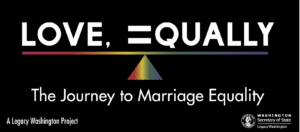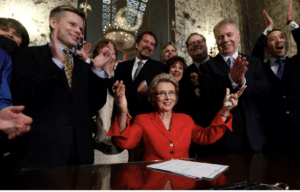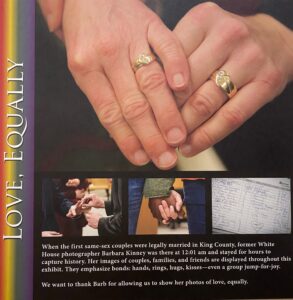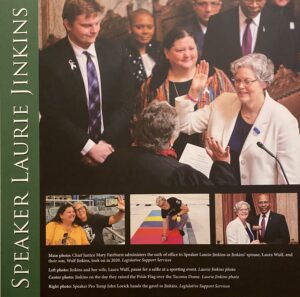
Notes From Olympia: Feb. 24, Week 7 of the 2023 Legislative Session
This edition includes deadlines and next steps for bills, updates on early learning related bills, a peek at the state’s four-year balanced budget requirement and Washington’s journey to marriage equality.
 (Photo Credit: Erica Hallock)
(Photo Credit: Erica Hallock)
Trivia
When Washington state legalized marriage equality in 2012, it joined how many other states in recognizing same-sex marriages?
Potato Day!
The excitement was palpable as the Washington Potato Commission held the first in-person “Potato Day” since 2020. Lines of potato fans stretched around the third floor of the Legislative Building well before the lunch hour as the common refrain of “did you get your potato yet?” rang throughout campus.
All joking aside, it is fiscal cutoff this week (see more information below about fiscal cutoff) and folks are tired/stressed/irritable. Friendly faces offering free comfort food is sometimes just what’s needed to put a pep back in your step! Potatoes are unifying.

The Washington Potato Commission brings comfort food to campus
(Photo Credit: Erica Hallock)
Cutoff Time – Again
This week, legislative focus – when not on potatoes – was on fiscal committees as they held marathon meetings to work through public hearings, amendments and votes on hundreds of bills prior to today’s fiscal cutoff deadline. After today, bills with a financial impact that have not been approved by the fiscal committee in its house of origin are considered “dead.” Frequently, bills heard in fiscal committees are amended to include two clauses – “null and void” or “subject to appropriation.” These clauses allow bills to proceed through the process but provide “escape hatches” if the policies put forward in the bill are not funded in the final adopted budget. Put another way, inclusion of these clauses makes implementation of the bill contingent upon budget funding.
Now, there are always exceptions to the rules, particularly in the legislative process, and the reality is no bill or idea is dead until the Legislature adjourns April 23. One exemption is that bills deemed “Necessary to Implement the Budget” (or NTIB) are not subject to cutoff dates. Further, concepts surfaced in bills can be amended into other bills or reflected in the budget.
Starting next week, action will turn to the respective Senate and House floors as those bodies work through all of the bills approved by the fiscal and policy committees. The next legislative cutoff is Wednesday, March 8 at 5 p.m. with the deadline for bills to be voted out of their house of origin (e.g., House bills must be approved by the House, and Senate bills approved by the Senate). We are at the time of session where you need to grab sleep when you can – kind of like living with a newborn. It is not unusual for one of the bodies (typically the House) to pull an all-nighter during this period.
Bill Hearings
SHB 1550. The House Appropriations Committee held a public hearing on Substitute House Bill 1550 Tuesday, which can be seen on TVW starting at the 34:45 minute mark. As a reminder, this bill would sunset Transitional Kindergarten (TK), replacing it with a new Transition to Kindergarten (TTK) program to be administered by the Office of Superintendent of Public Instruction (OSPI) with a role for the Department of Children, Youth and Families.
The Appropriations Committee hearing began with a panel that included State Superintendent of Public Instruction Chris Reykdal, DCYF Secretary Ross Hunter and Maddy Thompson, Governor Jay Inslee’s Senior Policy Advisor on Education and College Access. The opening panel spoke in opposition to the bill, stressing the importance of maximizing preschool access as well as the positive outcomes children are receiving from existing TK programs. Following that panel, several school district and education stakeholders reiterated the positive developmental outcomes from TK program participants as well as concerns that removing basic education as the funding source for TK could eliminate current programs as well as other supports for families such as school bus transportation.
Several early learning providers spoke in favor of the bill, focusing on the importance of the quality of services available in existing early learning programs. Additionally, early learning advocates stressed the importance of strong collaboration between school districts and community-based early learning providers so as not to negatively impact early learning programs.
As of this publication, SHB 1550 is on the possible executive session (vote) list for the Friday, Feb. 24 hearing.
Updates on additional early learning related bills include:
- Senate Bill 5225, which would increase eligibility for subsidized child care such as eligibility for dependents of child care employees and children regardless of immigration status, was passed out of the Senate Ways and Means Committee Wednesday.
- Senate Bill 5580, which would create a post-delivery and transitional care program and update the current Maternity Support Services (MSS) program, has a vote scheduled Feb. 23.
- One bill that did not receive a hearing is House Bill 1511, which would remove certain forms of income, such as Social Security benefits and child support, from income considerations related to child care subsidy and ECEAP. However, there are other avenues for priorities to move forward without a bill, including amendments onto other bills or as a proviso in the operating budget.
Legislative Lowdown
What is the state’s four-year balanced budget requirement? While much of the budgeting focus is on the upcoming two-year biennial budget cycle, 2012 legislation required the Legislature to pass four-year balanced budgets beginning in 2013. This means that our current budget writers must ensure both the 2023-25 and 2025-27 biennial budgets are balanced with a positive ending fund balance.
The Budget Outlook Workgroup holds a key role in this process by preparing an official state budget outlook for state revenues and expenditures. This outlook must include costs forecasted in the upcoming four years for continuing existing programs, projecting for future growth as well as implementation costs of various laws. The Economic and Revenue Forecast Council then approves this budget outlook and the Legislature uses this information to craft and pass a budget ensuring the state’s expenditures do not exceed projected revenues for the following four years.
Proponents of the bill establishing the four-year balanced budget requirement argued that a four-year balanced budget would move the state from reactionary, short-term budgeting to a more long-term view, resulting in more sustainable budgets that reduce out-year expenditure commitments that cannot be supported with existing revenues.
The requirement for a balanced four-year budget means that budget writers are keeping both a keen eye on the state’s recent and projected revenues (what they will have to spend) and its current spending commitments to ensure the final budget is balanced not just for the 2023-25 biennium, but also for 2025-27. As a result, it is not uncommon to see the strategy of “pushing a cost outside of the four-year” to mitigate projected costs. This can result in extending implementation dates for expanding services, so the law is on the books, but the costs do not hit the four-year budget.
To learn more about the budget process and related terminology, check out this helpful guide from the Office of Financial Management at the Governor’s Office which is updated annually.
Bill Tracker: Key Early Learning Bills
As the legislative session progresses, our resource page will update with a weekly bill tracker. Please note that legislation changes quickly, so the version on our website may not represent a bill’s latest version as it is published the Thursday of each week.
Trivia Answer
In 2012, Washington became the seventh state in the nation to legally recognize marriage equality.
On Feb. 14, 2023, the Washington Secretary of State unveiled an exhibit in its office celebrating the anniversary of the legalization of same-sex marriage in our state. The exhibit, Love, =qually, the Journey to Marriage Equality, is a project of Legacy Washington and contains profiles of prominent LGBTQ+ Washingtonians, a history of the marriage equality movement and amazing pictures and stories of individuals who played a role in achieving this milestone. TVW covered the exhibit opening that included remarks and personal memories from the key players in the movement, including former Governor Gregoire.
 (Photo Credit: Washington Secretary of State)
(Photo Credit: Washington Secretary of State)
The exhibit describes the “brick by brick” strategy proponents undertook to achieve the ultimate goal of marriage equality. The 2012 legalization represented a culmination of decades of work from countless advocates, including passing domestic partnerships in three phases and enacting an “everything but marriage” law.
During the 2012 legislative session, the Legislature passed SB 6239 which had the title “Relating to providing equal protection for all families in Washington by creating equality in civil marriage and changing the domestic partnership laws, while protecting religious freedom.” The measure passed the Senate on a 28-21 vote and the House on a 55-43 vote. I understand it was a nail biter securing sufficient votes for passage. I have shared this before, but I believe former Representative Maureen Walsh’s floor speech advocating for the bill’s passage is always worth a rewatch. (Spoiler alert: she did throw her daughter a wedding and the exhibit includes moving pictures of the joyful day).
 Surrounded by bill supporters, former Washington Governor Christine Gregoire signs legislation establishing full legal rights for same-sex couples to marry on Feb. 13, 2012
Surrounded by bill supporters, former Washington Governor Christine Gregoire signs legislation establishing full legal rights for same-sex couples to marry on Feb. 13, 2012
(Photo Credit: Washington State Secretary of State)
Following the Governor’s signature of the bill, opponents secured a referendum on the November 2012 ballot, putting the question of marriage equality before the Washington voters. Voters approved Referendum 74 with a 54% approval and the new law took effect Dec. 6 with the first marriages performed on Dec. 9. You may recall from last week’s “Notes From Olympia” that an original “Capsule Keeper” Jennifer Estroff placed her pro Referendum 74 lapel pin in the 2014 time capsule. I also saw a few of the pins on campus Valentine’s Day as folks were in town celebrating the exhibit opening at the Secretary of State’s Office.
 Displays include photos and personal stories
Displays include photos and personal stories
(Photo Credit: Erica Hallock)
Two sitting lawmakers feature prominently in the exhibit, Washington’s first openly lesbian Speaker of the House, Speaker Laurie Jinkins and State Senate Floor Leader Sen. Jamie Pedersen. This short video includes Speaker Jinkins and Senator Pedersen discussing the impact of marriage equality for them and their families.
 (Photo Credit: Erica Hallock)
(Photo Credit: Erica Hallock)
The “Love, Equally” book containing more great stories and pictures is available for purchase from the Secretary of State for $30 (email info@sos.wa.gov).
You now have at least two reasons to visit the Capitol campus: to see this inspiring exhibit and view the time capsule. Throw in some cinnamon bread from Wagner’s Bakery just down the street and you have a perfect day!
Sources: Secretary of State/Legacy Washington Love, =qually project and observations of the author’s visit to the exhibit.
About the Author

Erica Hallock
Director, Policy & Advocacy, Start Early Washington
Erica Hallock serves as the Director of Policy and Advocacy for Start Early Washington. She has worked in early childhood, health and human services policy in both California and Washington state.
More Like This
Contact Us
Connect with our team to learn more about our work or discuss how we can support policy and advocacy work for your organization.
Washington State Hub
Learn more about our work in Washington state and access relevant resources and publications.
